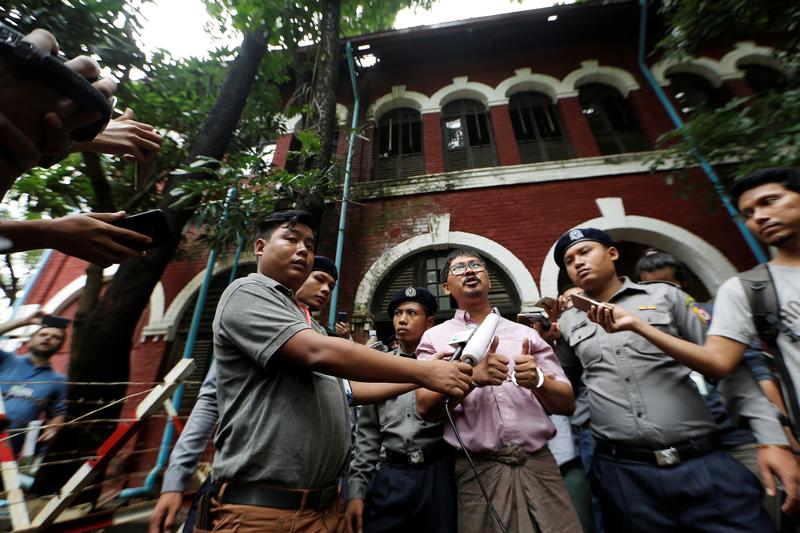A judge in Burma said Monday that he would decide next week whether to proceed with prosecution or bring an end to the high-profile trial of two Reuters journalists who have been accused of possessing state secrets.
Both sides’ lawyers gave arguments at a hearing in Yangon on Monday and lead prosecutor Kyaw Min Naing told the court that the Reuters reporters’ trial should continue, alleging that they were proven to have been found in possession of secret government documents when police arrested them last year on the outskirts of the commercial capital.
Kyaw Min Naing said the offending materials included the trip schedule of Pope Francis, who visited Burma in November. The pontiff’s itinerary and several other documents were found on the accused men’s phones at the time of their arrest, the lead prosecutor said, arguing that this put them in violation of Burma’s colonial-era Official Secrets Act.
A lawyer for the defendants, Khin Maung Zaw, told reporters after Monday’s hearing that the trip schedule of Pope Francis was not a secret document, and had in fact been published on The Vatican’s official website.
The accused Reuters journalists, Wa Lone and Kyaw Soe Oo, were detained by Burmese authorities on Dec. 12. They face up to 14 years in prison if found guilty under the Official Secrets Act.
Their next hearing has been scheduled for July 9.
[related]
The drawn-out trial has been criticised by press freedom advocates both in Burma and abroad as Reuters has insisted that the two men were arrested simply for doing their jobs.
They were detained in December as they were reporting on a massacre of Rohingya Muslims in the village of Inn Din, Rakhine State, earlier that year, in which Burmese state security forces were implicated. Reuters subsequently published a lengthy report on the massacre, and seven soldiers were sentenced to 10 years in prison for their role in the killings, according to the military.
“At this critical juncture, we hope that the court will decline to charge Wa Lone and Kyaw Soe Oo and order their prompt release,” Stephen J. Adler, Reuters’ president and editor-in-chief, said in a statement on Monday.
“Freedom of the press is essential in any democracy, and to charge Wa Lone and Kyaw Soe Oo under these circumstances, without any proof of their having done anything unlawful, would seriously undermine Myanmar’s constitutional guarantee of free speech. We remain optimistic that the court will thoroughly consider the evidence before it and bring this proceeding to a close as quickly as possible.”
Among the controversies that have surrounded the case was testimony given by one witness for the prosecution, a police officer involved in the Reuters reporters’ arrest who apparently veered off script in April when he told the court that the two men were entrapped by authorities.
“We hope for the best thing [at next week’s hearing], and we are prepared for the worst,” Khin Maung Zaw said on Monday.



